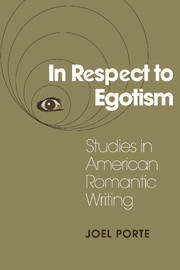Book contents
- Frontmatter
- Contents
- Preface
- Acknowledgments
- In Respect to Egotism
- Introduction: Writing, Reading, Romanticism
- 1 “Where … Is This Singular Career to Terminate?”: Bewildered Pilgrims in Early American Fiction
- 2 “Where There Is No Vision, the People Perish.…”: Prophets and Pariahs in the Forest of the New World
- 3 Poe: Romantic Center, Critical Margin
- 4 Emerson: Experiments in Self-Creation
- 5 Hawthorne: “The Obscurest Man of Letters in America”
- 6 Thoreau's Self-Perpetuating Artifacts
- 7 Melville: Romantic Cock-and-Bull; or, The Great Art of Telling the Truth
- 8 Douglass and Stowe: Scriptures of the Redeemed Self
- 9 Whitman: “Take Me as I Am or Not at All.…”
- Interchapter: Walt and Emily
- 10 Dickinson's “Celestial Vail”: Snowbound in Self-Consciousness
- Notes
- Index
- CAMBRIDGE STUDIES IN AMERICAN LITERATURE AND CULTURE
3 - Poe: Romantic Center, Critical Margin
Published online by Cambridge University Press: 24 March 2010
- Frontmatter
- Contents
- Preface
- Acknowledgments
- In Respect to Egotism
- Introduction: Writing, Reading, Romanticism
- 1 “Where … Is This Singular Career to Terminate?”: Bewildered Pilgrims in Early American Fiction
- 2 “Where There Is No Vision, the People Perish.…”: Prophets and Pariahs in the Forest of the New World
- 3 Poe: Romantic Center, Critical Margin
- 4 Emerson: Experiments in Self-Creation
- 5 Hawthorne: “The Obscurest Man of Letters in America”
- 6 Thoreau's Self-Perpetuating Artifacts
- 7 Melville: Romantic Cock-and-Bull; or, The Great Art of Telling the Truth
- 8 Douglass and Stowe: Scriptures of the Redeemed Self
- 9 Whitman: “Take Me as I Am or Not at All.…”
- Interchapter: Walt and Emily
- 10 Dickinson's “Celestial Vail”: Snowbound in Self-Consciousness
- Notes
- Index
- CAMBRIDGE STUDIES IN AMERICAN LITERATURE AND CULTURE
Summary
In March 1850, about a half-year after Edgar Allan Poe's mysterious collapse and death in Baltimore at the age of forty, the Southern Literary Messenger, the journal Poe had edited in 1836, printed a long memorial notice in the form of a review of The Works of Edgar Allan Poe, edited by Nathaniel P. Willis, James Russell Lowell, and Rufus P. Griswold. The author of the notice predictably spoke with great bitterness of this appropriation of his fellow southerner's work by the northern literary establishment (though born in Boston – indeed, his first book of poems, Tamerlane, was inscribed “by a Bostonian” – Poe grew up in Virginia and made common cause with southern writers, especially when it came to the hated abolitionists). Willis, a popular and fashionable magazinist of the time who had in fact befriended Poe, is cattily dismissed as “the man milliner of our literature”; Griswold, the self-important literary entrepreneur whom Poe inexplicably made his executor and who proceeded systematically both to calumniate Poe and to alter his work, is viewed sarcastically as that “great Apollo of our literary heavens” whose “eminent” name was trotted out by the publisher in order to confer respectability on the raffish genius now being celebrated; and Lowell, denominated a New England “literary insect” for his “transcendentalism, socialism, and abolition,” is mockingly praised for having “found his sable sympathies sufficiently extensive to take in the distressed master of the Raven.”
- Type
- Chapter
- Information
- In Respect to EgotismStudies in American Romantic Writing, pp. 75 - 105Publisher: Cambridge University PressPrint publication year: 1991

